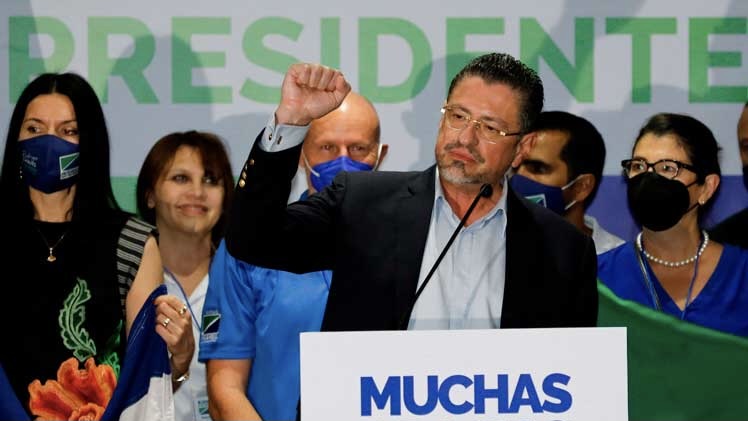Rodrigo Chaves of the newly created center-right Social Democratic Progress Party won the presidential run-off held in Costa Rica on April 3 and became the 49th president of the Central American country. According to the results published by the Supreme Electoral Court (TSE), with 98.15% of the votes processed, economist Chaves garnered 52.85% of the votes. Meanwhile, his rival and former president José María Figueres (1994-1998) of the center-left National Liberation Party (PLN) secured 47.15% of the votes.
Following the announcement of the results, Chaves addressed a crowd of his supporters in the capital San Jose, celebrated his victory and called on his opponent to work together for the good of the country. “I receive with the deepest humility this sacred decision of the Costa Rican people. This result for me is not a medal or a trophy, but an enormous responsibility, full of challenges and difficulties that all of us are going to solve,” said Chaves. “I extend my thanks to José María Figueres and all the people who voted for him, and I humbly beg him and his party to work together to make possible what Mr. José Figueres Ferrer (Figueres’ father and three times former president) himself called the Costa Rican miracle,” he added.
For his part, José María Figueres, who was the winner of the first round, recognized the results, conceded his defeat and thanked his supporters for their support and the TSE for its work. “Costa Rica has voted and the people have spoken. Since we are democrats, we will always be respectful of that decision. I congratulate Rodrigo Chaves and wish him the best,” said Figures. He added that “Costa Rica is experiencing a deep crisis” and promised to help “rescue the country and move forward putting the differences aside.”
The outgoing President Carlos Alvarado of the center-left Citizens’ Action Party, during whose presidency Chaves served briefly as finance minister, also congratulated him. Alvarado said that he had telephoned the president-elect “to express my congratulations, carry out an orderly transition and express my best wishes in the tasks that he will face as president.”
Challenges for new government
The new government will assume office on May 1 for the period 2022-2026. It faces the challenge of reinvigorating the country’s battered economy. 23% of Costa Rica’s population is living in poverty and unemployment is soaring at 14%. The country has a 1.78 billion USD loan with the IMF and has been mired in a series of corruption scandals in recent decades.
At the same time, the president-elect faces the challenge of governing with just 10 lawmakers out of the 57 that make up the unicameral parliament. He will be forced to negotiate with five other parties represented in the new Legislative Assembly, especially with the PLN, which is the largest faction with 19 legislators.
60-year-old Chaves is an economist who worked for the World Bank for almost 30 years and served as finance minister under outgoing President Alvarado for six months and forged an anti-establishment reputation. He blames previous governments of traditional parties for the crisis facing the country.
He has promised to create jobs and combat poverty. He has vowed to increase investments in green energy, reorganize the public services budget, and introduce a universal minimum pension. He has claimed he wants to once again make Costa Rica into an international tourist destination to finance his programs. He has pledged to shake up the political elite and use referendums to bypass Congress to bring necessary changes. He has also proposed implementing executive decrees to make basic goods and services cheaper.
High abstentionism
The elections were marked by high levels of abstentionism. According to the TSE, 43.23% of the eligible voters abstained from exercising their voting rights, a figure higher than in the first round on February 6, when it was the record 40.29%. It seems like the scandalous past of both candidates further demotivated Costa Ricans to take part in the elections.
Chaves was investigated over sexual harassment complaints brought by several female co-workers while he was a senior official at the World Bank, which he had dismissed as jokes that were “misinterpreted due to cultural differences.” In 2019, he was demoted, though not fired, at the World Bank from his position as executive for considering that his behavior was beyond jokes. Meanwhile, businessman Figueres was investigated for corruption, allegedly taking 900,000 USD from a French telecoms company Alcatel, and influencing state officials for contracts with Alcatel. In 2004, he had to resign as executive director of the World Economic Forum amid the accusations.
Nevertheless, between two scandal-tainted candidates, those who voted seemed more focused on the economy and betted on an economist to be the successor to Alvarado, who indebted the country with the IMF’s loan, implemented various neoliberal economic measures, and led the country into an enormous economic crisis.





